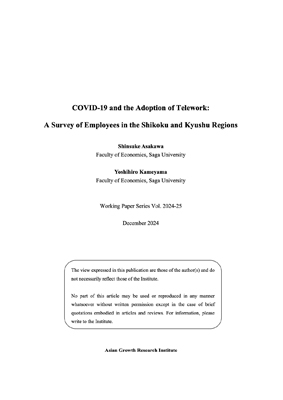COVID-19 and the Adoption of Telework: A Survey of Employees in the Shikoku and Kyushu Regions

| 執筆者 | 浅川 慎介、亀山 嘉大 |
|---|---|
| 発行年月 | 2024年 12月 |
| No. | 2024-25 |
| ダウンロード | 909KB |
内容紹介
This study examines the impact of telework (TW) adoption on labor and health outcomes, and time use, using a questionnaire survey for employees working in Kyushu and Shikoku regions. Using a two-stage least squares (2SLS) estimation with changes in the number of new positive COVID-19 cases per 100,000 people in respondents’ local municipalities where their workplaces or homes are located as the instrumental variable, we identify the impact of exogenous TW adoption on workers' labor and health outcomes from the pre- pandemic period (November 2019) to the post-pandemic period (August and December 2021) and from the COVID-19 expansion period (August 2021) to the contraction period (December 2021). The results show that the exogenous TW adoption does not significantly affect work efficiency or productivity, it reduces overtime, commuting time, and daily physical activity, and increases life satisfaction. This increase in satisfaction is associated with more time spent on hobbies, sleep, and childcare. An exogenous increase in TW days is also associated with more accounting tasks and increased liaison and coordination within the company and with business partners.
